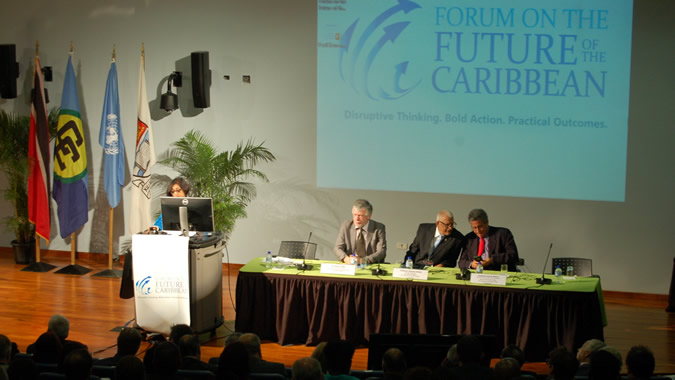ECLAC Deputy Executive Secretary Opens Caribbean Future Forum
Antonio Prado signaled that if the Caribbean is to achieve equitable growth in an environmentally sustainable manner, critical challenges will have to be addressed.

ECLAC’s Deputy Executive Secretary Antonio Prado signaled that if the Caribbean is to achieve equitable growth in an environmentally sustainable manner, critical challenges will have to be addressed, the most urgent of these being the high and unsustainable levels of public debt.
Speaking at the opening ceremony of the Forum on the Future of the Caribbean at the University of the West Indies St Augustine campus in Trinidad and Tobago on 5 May 2015, Mr. Prado identified the subregion as one of the most debt-constrained in the world.
Noting that the countries of Latin America and the Caribbean are at a crossroads in terms of their future growth and distribution capacity, he suggested that productivity gains, including product diversification will be needed. These developments, he cautioned, would not occur without careful planning. Investment in basic and higher education, science and technology and technical capacity were essential for ushering in a new era of growth with greater equality in Latin America and the Caribbean.
In the context of “disruptive thinking” which was the theme of the forum, he identified a number of areas where the Caribbean academic community can make a difference. He called for ‘open day’ when faculty and staff share ideas with the public on various development challenges confronting the society. He suggested that a strengthened culture of openness can provide the seeds for new ideas for basic and applied research that can lead to new products, services, methods and techniques to boost growth and development.
He also called for increased attention to be given to micro-level research that seeks to understand how individual agents and organisations function and succeed. The study of different categories of firms, for example, could provide rich insight into their motivations and what makes them profitable and competitive.
Addressing the role of education in the development effort, he said it was critical that Caribbean universities strengthen their links with private businesses, business development agencies and bureaus of standards. He noted that the sharing of experiences with these institutions, both those that have failed and those that are successful, provide an ideal avenue for creating dynamic networks that can serve as the scaffolding for the development of commercial products and services able to compete in international markets.
He suggested that think tanks like ECLAC should complement the work of the academy, noting that in this regard, ECLAC has consistently contributed to development thinking in the region.
He emphasised that the task of regional transformation was herculean, and urged the forum participants to dig deep to come up with workable solutions to advance the region’s development.
Subregional headquarter(s) and office(s)
Related link(s)
Country(ies)
- Caribbean
Contact
Public Information Unit
- prensa@cepal.org
- (56 2) 2210 2040